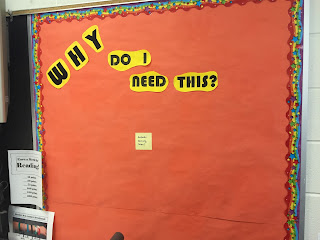"I'm going to be a chef" (or vet or soldier or fashion designer or unicorn trainer) "so why do I have to read books and write essays?"
Step One: The Homework
During the first week of school, I assign the first "real" homework, and I introduce it by telling students they are going to have to do some research. Before they really have a chance to panic, though, I discuss primary vs. secondary research and tell them how cool it is to interview a primary source. The assignment is short and sweet:
Step Two: The Discussion
The next day, everyone gets to share one result of their research - something someone told them in answer to Question #1. Kids tell me about adults in their lives who read credit card statements, operation manuals, legal documents, textbooks for college, and cookbooks; they talk about people who write police reports, technical instructions, emails for work, auto repair plans, and HTML code. The students teach the lesson for me! After everyone has shared, I ask, "Why did I have you do this?" and they tell me! It's magical...probably one of the most impactful lessons I do all year.
Step Three: The Bulletin Board
Even though the discussion part is AWESOME, this is actually my favorite part. Once everyone we've all shared our research (Yes, even me! I perform my own primary research by asking my ship mechanic husband what he reads and writes for his job, and I share that with the kids!), I hand out colorful index cards or cutouts, whatever I have on hand that year. Each student writes down one way to use reading or writing in real life, and I post them all on the bulletin board. I leave it up all year, so students can be reminded why they're working so hard in English. I'm hoping if they see reality written by other seventh-graders, they will believe that no matter where they go in life, reading and writing will be there!
 |
| (The sticky note says, "Answer coming soon." |
How do you convince students your subject is relevant?


No comments:
Post a Comment